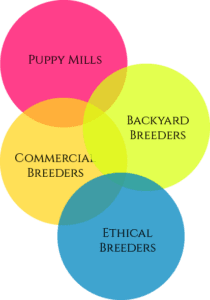Key Takeaways on Brussels Griffon Adoption
- Brussels Griffons are affectionate and form strong bonds with their owners, making them excellent companions.
- Adoption costs typically range from $300 to $500, depending on the rescue organization and location.
- These dogs require regular grooming, especially those with rough coats, which need trimming every few months.
- Due to their small size, weighing between 8-12 pounds, they are suitable for apartment living.
- Common health issues include breathing difficulties and joint disorders, so regular vet check-ups are essential.
Why Consider a Brussels Griffon?
Choosing to adopt a Brussels Griffon can be a rewarding experience for those seeking a loyal and affectionate companion. These small dogs are known for their unique appearance and endearing personalities. They thrive on human interaction and are often described as having a “human-like” expression due to their expressive eyes and small, flat faces. Adopting a Brussels Griffon means welcoming a lively and intelligent pet into your home.
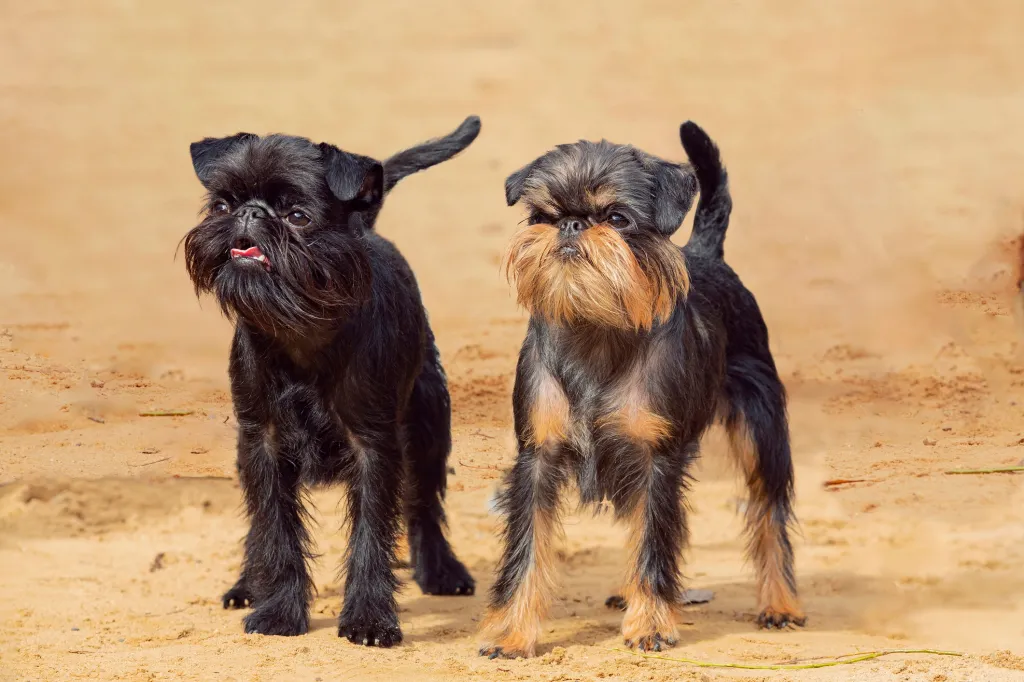
“Brussels Griffon Breed Guide and Pet …” from www.healthypawspetinsurance.com and used with no modifications.
Unique Traits of the Breed
Brussels Griffons are part of the toy group, and their compact size makes them perfect for families living in smaller spaces. Despite their small stature, they possess a big personality and are often described as curious and alert. Their inquisitive nature means they love to explore and engage with their surroundings.
These dogs come in two coat types: smooth and rough. Smooth-coated Griffons are easier to groom, while rough-coated ones require regular trimming to maintain their appearance. Regardless of coat type, they are low-shedding, making them a suitable choice for those concerned about pet hair in the home.
Common Personality Features
Brussels Griffons are known for their playful and affectionate nature. They form strong bonds with their owners and enjoy being part of family activities. This breed is often described as “velcro dogs” because they love to stick close to their humans. They thrive on companionship and can experience separation anxiety if left alone for long periods.
While they are generally good with children, it’s important to teach kids how to interact with them gently. Their small size makes them more susceptible to injury from rough play. Additionally, Brussels Griffons are known for being alert and may bark at unfamiliar noises or strangers, making them good watchdogs.
Ideal Household Environments
Brussels Griffons adapt well to various living situations, but they are particularly suited to apartment living due to their small size. They don’t require a large yard, but regular walks and playtime are essential to keep them mentally and physically stimulated.
This breed is ideal for households where someone is often home, as they enjoy being around their family. They can also live harmoniously with other pets, especially if they are introduced at a young age. Overall, Brussels Griffons thrive in environments where they receive plenty of attention and affection.
Understanding Adoption Costs and Considerations
Adopting a Brussels Griffon can be a cost-effective way to bring one of these delightful dogs into your home. Adoption fees typically range from $300 to $500, depending on the rescue organization and your location. This fee often includes initial veterinary care, such as vaccinations and spaying or neutering.
Initial Adoption Fees
When adopting a Brussels Griffon, it’s important to consider the initial costs involved. Adoption fees usually cover basic veterinary care, but additional expenses may include purchasing essential supplies like a crate, leash, food, and grooming tools. It’s wise to budget for these items to ensure a smooth transition for your new pet.
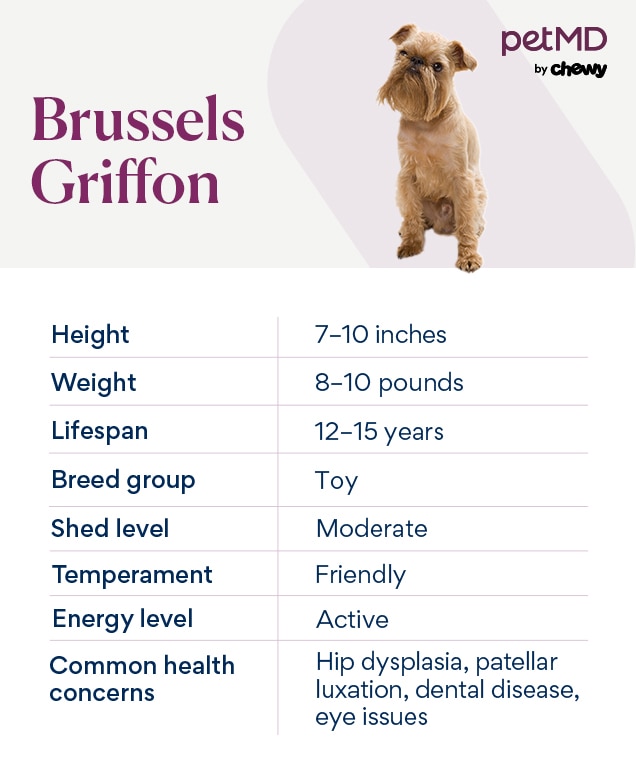
“Brussels Griffon Dog Breed Health and …” from www.petmd.com and used with no modifications.
Long-term Care Costs
Beyond the initial adoption fees, owning a Brussels Griffon involves ongoing expenses. Regular veterinary check-ups, vaccinations, and preventative care are essential to keep your dog healthy. Due to their potential health issues, such as breathing difficulties and joint disorders, veterinary care may be more frequent or costly compared to other breeds.
Grooming is another consideration, especially for rough-coated Griffons. While smooth-coated dogs require minimal grooming, rough-coated ones need regular trimming, which can be done at home or by a professional groomer.
Budgeting for Your Brussels Griffon
To ensure you’re financially prepared for a Brussels Griffon, it’s crucial to budget for both initial and ongoing costs. Here’s a breakdown of typical expenses:
- Adoption Fee: $300-$500
- Initial Supplies: $150-$300 (crate, leash, food, etc.)
- Annual Veterinary Care: $200-$500
- Grooming: $50-$100 per session for rough-coated Griffons
- Food and Treats: $300-$500 annually
By planning ahead and budgeting for these expenses, you can ensure that you provide the best care for your new Brussels Griffon.
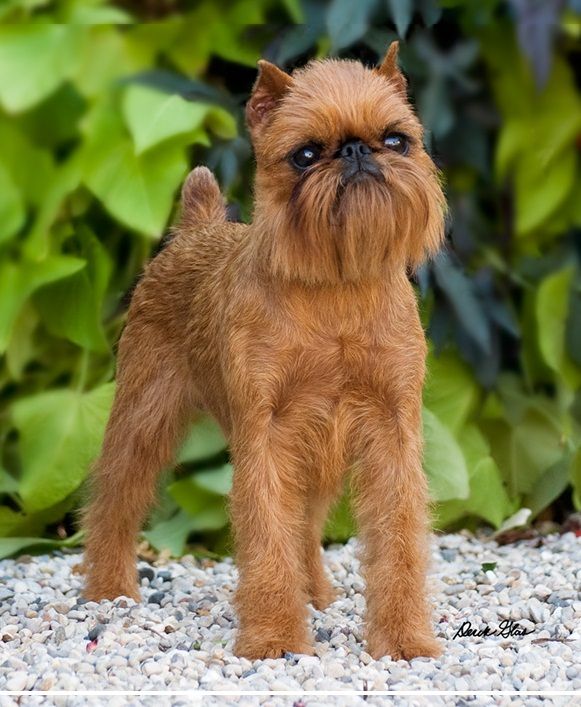
“Brussels Griffon Dog 2024 | levitan.com” from levitan.com and used with no modifications.
Size and Appearance
Brussels Griffons are small dogs with a distinct appearance that sets them apart from other breeds. Understanding their size and grooming needs can help you determine if they are the right fit for your home. If you’re considering adding one to your family, learn more about the rescue pet adoption journey to bring a Brussels Griffon from shelter to sofa.
Average Weight and Height
These dogs typically weigh between 8 to 12 pounds and stand about 7 to 10 inches tall. Their small size makes them easy to manage and suitable for urban living. Despite their diminutive stature, they have a sturdy build and an energetic demeanor. For more information about their characteristics, check out this Brussels Griffon review.
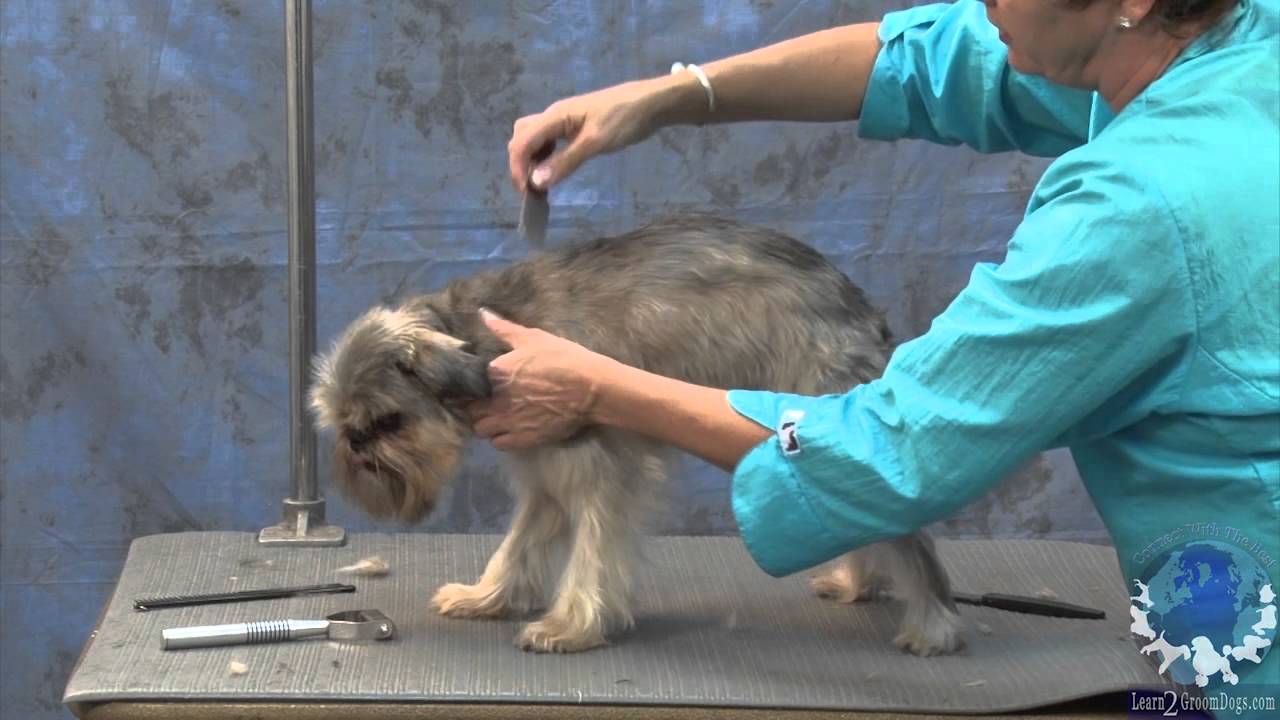
“Grooming a Pet Brussels Griffon with …” from www.youtube.com and used with no modifications.
Coat Types and Grooming Needs
Brussels Griffons come in two coat types: smooth and rough. Smooth-coated Griffons have a short, glossy coat that requires minimal grooming. A weekly brush and occasional bath are usually sufficient to keep them looking their best. For more information about the breed, you can visit Your Purebred Puppy.
Rough-coated Griffons, on the other hand, have a wiry coat that needs regular trimming to prevent matting. While some owners choose to groom their dogs at home, others prefer professional grooming services to maintain the coat’s texture and appearance.
Color Variations
Brussels Griffons come in a variety of colors, including red, black, and tan, or a combination of black and reddish-brown, known as “belge.” These color variations add to their charm and individuality, making each dog unique in its own way.
Understanding the grooming needs and appearance of Brussels Griffons can help you decide if this breed is the right match for your lifestyle and preferences.
Health and Breathing Concerns
Brussels Griffons, like many small breeds, have specific health concerns that potential adopters should be aware of. Being informed about these issues will help you provide the best care for your pet and ensure a long, healthy life.
One of the most common health concerns in Brussels Griffons is related to their brachycephalic (short-nosed) structure. This can lead to breathing difficulties, especially in hot or humid weather. Additionally, their prominent eyes are susceptible to injury and infections, requiring regular monitoring and care. For those considering pet adoption, understanding pet adoption myths can be beneficial.
Joint problems, such as patellar luxation, are also prevalent in this breed. This condition occurs when the kneecap dislocates, causing discomfort and mobility issues. Regular veterinary check-ups can help detect and manage such conditions early on.
Despite these potential health challenges, many Brussels Griffons live long, healthy lives with proper care and attention. Routine veterinary visits and a healthy lifestyle can significantly reduce the risk of serious health problems.
- Regular vet check-ups are crucial for early detection of health issues.
- Monitor breathing and avoid strenuous activities in hot weather.
- Protect their eyes from potential injuries and infections.
- Provide a balanced diet to maintain a healthy weight.
Common Health Issues
Brussels Griffons are prone to certain health issues that can affect their quality of life. Understanding these common problems can help you take preventative measures and seek appropriate treatment when necessary.
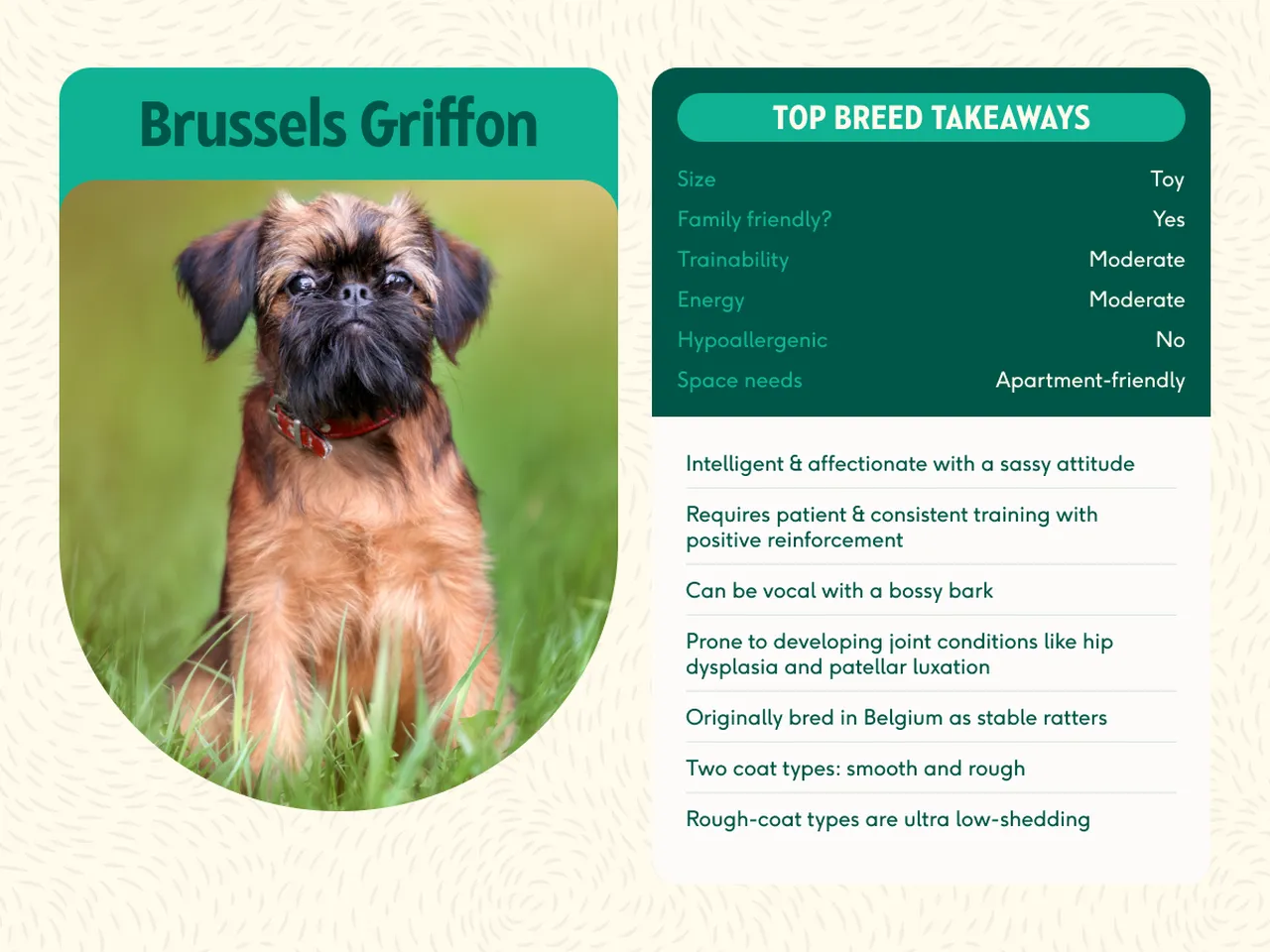
“Brussels Griffon breed insights: care …” from lyka.com.au and used with no modifications.
Breathing Difficulties
Due to their brachycephalic nature, Brussels Griffons can experience breathing difficulties, especially in extreme temperatures. Their short muzzles can lead to obstructed airways, making it harder for them to breathe efficiently.
To manage this, it’s important to keep your dog cool and avoid overexertion during walks or playtime. In severe cases, surgical intervention may be required to improve their breathing capabilities. Always consult with your veterinarian for the best course of action.
Preventative Health Measures
Proactive care is key to ensuring your Brussels Griffon remains healthy and happy. Regular veterinary check-ups, vaccinations, and dental care are essential components of their healthcare routine.
Additionally, providing a nutritious diet and maintaining an appropriate weight can help prevent obesity-related issues, which can exacerbate breathing and joint problems. Regular exercise and mental stimulation are also important to keep your dog physically fit and mentally engaged.
Pros and Cons of Owning a Brussels Griffon
Before adopting a Brussels Griffon, it’s important to weigh the pros and cons of owning this unique breed. Understanding their needs and characteristics will help you determine if they are the right fit for your family and lifestyle.
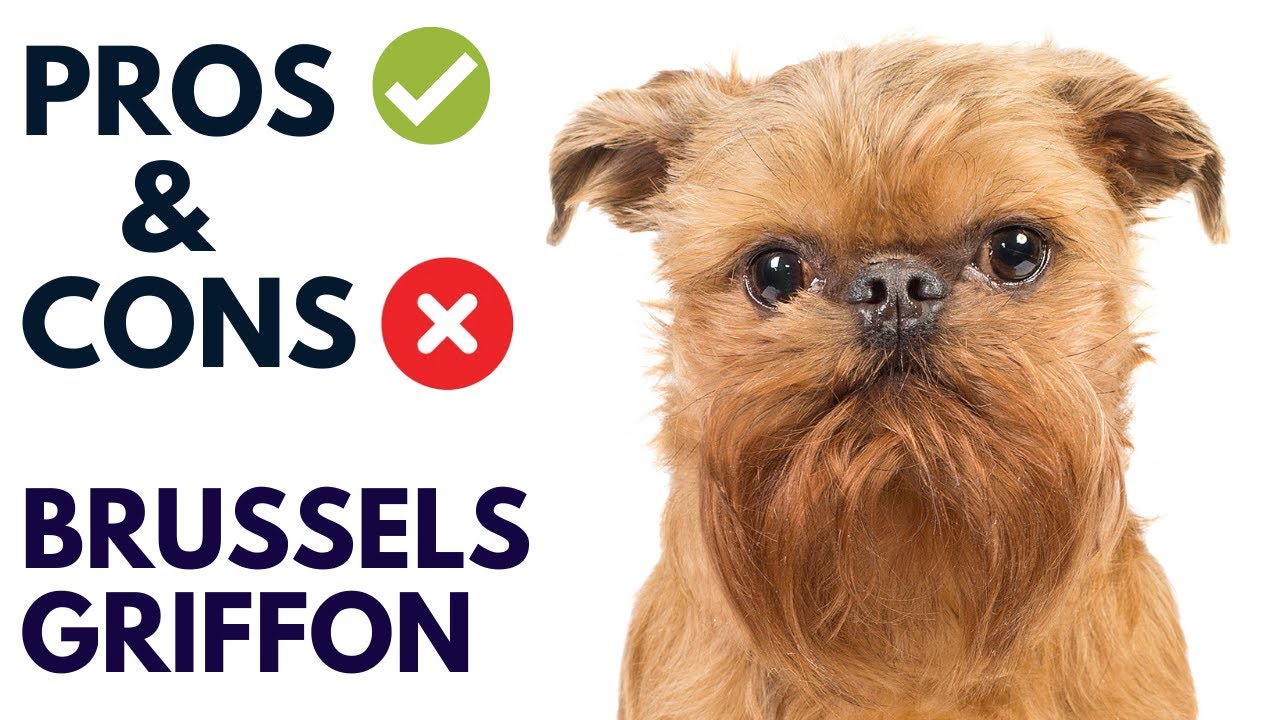
“Brussels Griffon Dog Breed Pros and …” from www.youtube.com and used with no modifications.
Pros: Companion Traits
Brussels Griffons are known for their affectionate and loyal nature. They form strong bonds with their owners and thrive on companionship. Their playful and curious personalities make them entertaining and delightful pets. Additionally, their small size makes them well-suited for apartment living.
Cons: Maintenance Challenges
Despite their many positive traits, Brussels Griffons come with certain challenges. Their grooming needs, especially for rough-coated varieties, require regular attention. They are also prone to specific health issues that may require ongoing veterinary care. Furthermore, their strong attachment to their owners can lead to separation anxiety if left alone for extended periods. For more detailed information, you can refer to this Brussels Griffon review.
Living with a Brussels Griffon
Living with a Brussels Griffon means welcoming a lively and affectionate companion into your home. They enjoy being part of family activities and thrive in environments where they receive plenty of attention and affection.
These dogs are best suited for families or individuals who can spend time with them and provide the mental and physical stimulation they need. With the right care and environment, a Brussels Griffon can be a wonderful addition to any household.
Reputable and Ethical Breeding
When considering adopting a Brussels Griffon, it’s important to seek out reputable and ethical breeding practices. This ensures that you bring home a healthy and well-adjusted pet.
Finding an Ethical Breeder
To find an ethical breeder, start by conducting thorough research. Look for breeders who are registered with recognized kennel clubs and have a history of responsible breeding practices. Ethical breeders prioritize the health and well-being of their dogs and are transparent about their breeding methods. Additionally, you can learn more about how to support local pet rescue organizations as part of your journey to finding a responsible breeder.
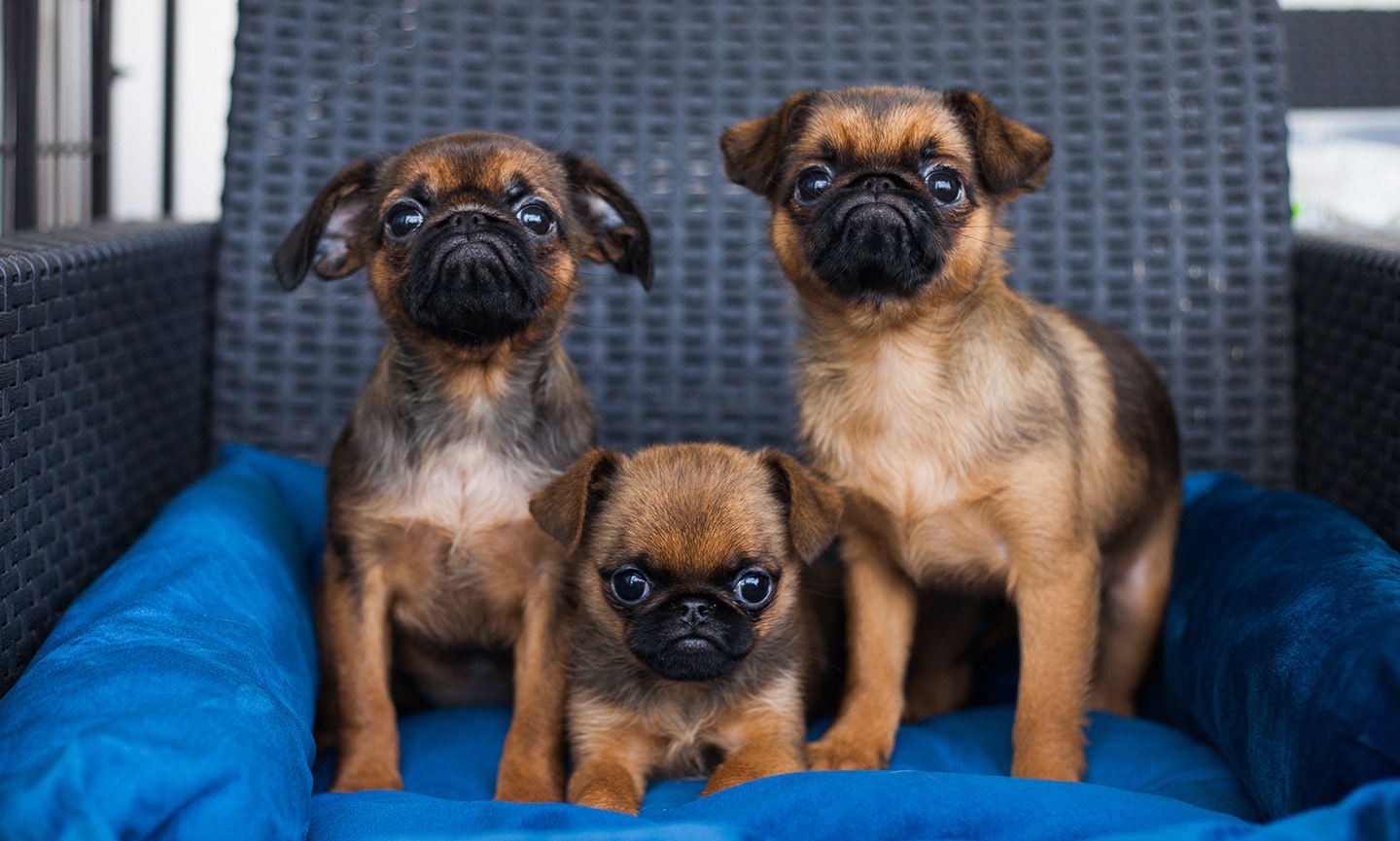
“Brussels Griffon Breed: Characteristics …” from www.chewy.com and used with no modifications.
Breeding Standards and Practices
Ethical breeders adhere to strict breeding standards and practices to ensure the health and temperament of their dogs. They conduct health screenings for genetic conditions and provide a nurturing environment for their puppies. Visiting the breeder’s facility can give you insight into their practices and the conditions in which the dogs are raised. For more insights on pet care, you can explore this pet home preparation guide.
Besides that, ethical breeders are committed to finding suitable homes for their puppies and often provide support and guidance to new owners. They should be willing to answer any questions you have and provide documentation of the puppy’s health history.
Finding A Reputable Breed Specific Rescue Group
For those considering adoption, finding a reputable breed-specific rescue group is a great option. These organizations are dedicated to rescuing and rehoming Brussels Griffons in need. They often have dogs of various ages and temperaments, making it easier to find a match for your household.
Rescue groups provide valuable resources and support for new owners, ensuring a smooth transition for both the dog and the family. They also conduct thorough assessments of each dog’s health and behavior to ensure they are placed in suitable homes.
Comparing with Similar Breeds
When considering a Brussels Griffon, it’s helpful to compare them with similar breeds to determine which one best suits your lifestyle and preferences. Some breeds that share similarities with Brussels Griffons include the Pug, Pekingese, and Chihuahua.
The Pug, like the Brussels Griffon, is a small, affectionate breed with a distinct appearance. They are known for their playful nature and adaptability to various living situations. However, Pugs may have more pronounced breathing issues due to their even shorter muzzles.
Pekingese are another toy breed known for their charming personalities and luxurious coats. They require regular grooming and can be more independent compared to Brussels Griffons. This breed may be better suited for owners who prefer a less clingy companion.
Chihuahuas, on the other hand, are known for their bold personalities and small size. They are low-maintenance in terms of grooming but can be wary of strangers and may not be as sociable as Brussels Griffons. They are a good option for those seeking a compact and spirited pet.
By comparing these breeds, you can make an informed decision about which dog aligns best with your expectations and lifestyle. For more information, you can check out this Brussels Griffon review.
Brussels Griffon vs. Pug
When comparing the Brussels Griffon to the Pug, both breeds share a love for companionship and are known for their affectionate nature. However, there are some key differences to consider. Pugs have a more relaxed and laid-back demeanor, making them suitable for families looking for a low-energy companion. In contrast, Brussels Griffons tend to be more alert and curious, which can make them slightly more demanding in terms of mental stimulation. If you’re considering a dog that doesn’t shed much, you might want to explore small dog breeds that don’t shed for more options.
Both breeds can experience breathing issues due to their brachycephalic features, but Pugs are generally more prone to these problems. Therefore, it’s important to monitor their activity levels, especially in hot or humid weather. Additionally, while both breeds are good with children, Pugs are often more tolerant of rough play, whereas Brussels Griffons may require more gentle handling due to their smaller size.
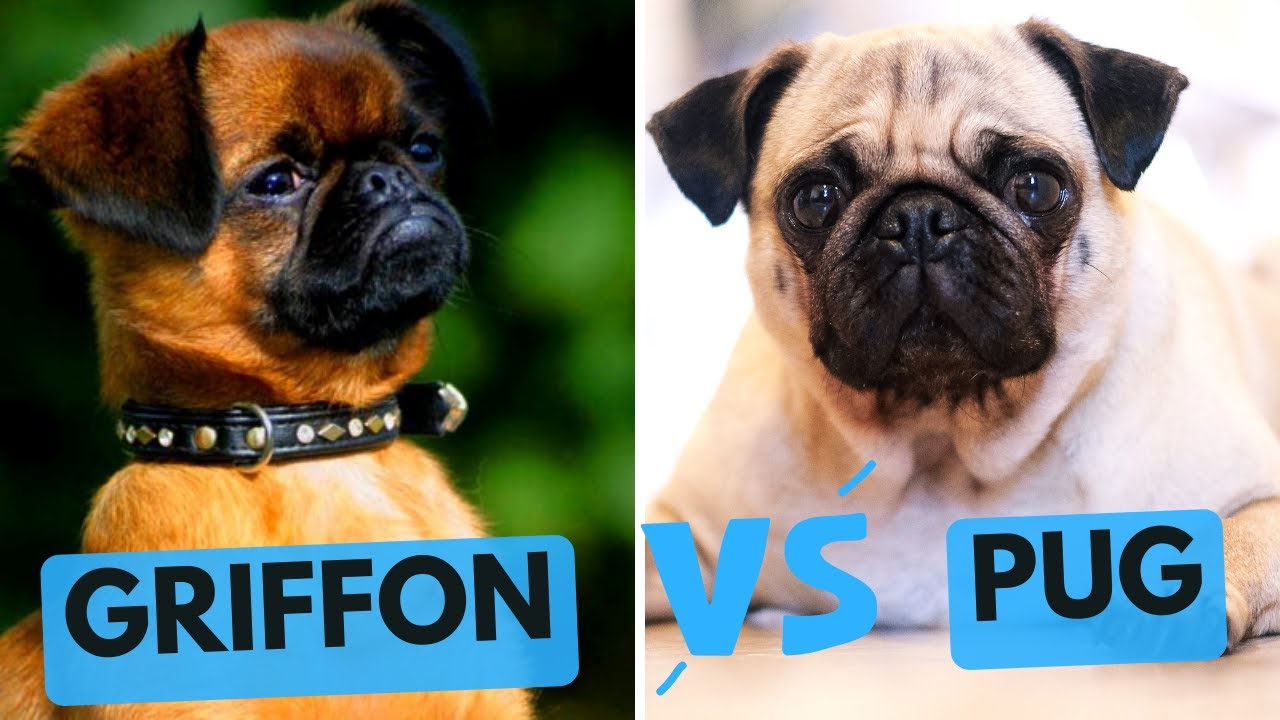
“Pug vs Brussels Griffon (Petit …” from www.youtube.com and used with no modifications.
Brussels Griffon vs. Pekingese
- Pekingese have a longer, more luxurious coat compared to the wiry coat of a rough-coated Brussels Griffon.
- Pekingese are known for their independent nature, while Brussels Griffons are more dependent on human interaction.
- Both breeds are small and suited for apartment living, but Pekingese may require more grooming due to their coat.
When deciding between a Brussels Griffon and a Pekingese, consider your grooming preferences and the level of independence you desire in a pet. Pekingese require more grooming, but they are generally more independent, which may appeal to owners who prefer a pet that is less demanding in terms of attention.
On the other hand, Brussels Griffons thrive on companionship and may be better suited for families or individuals who can spend more time with them. Both breeds are charming and make excellent companions, so it ultimately comes down to personal preference and lifestyle.
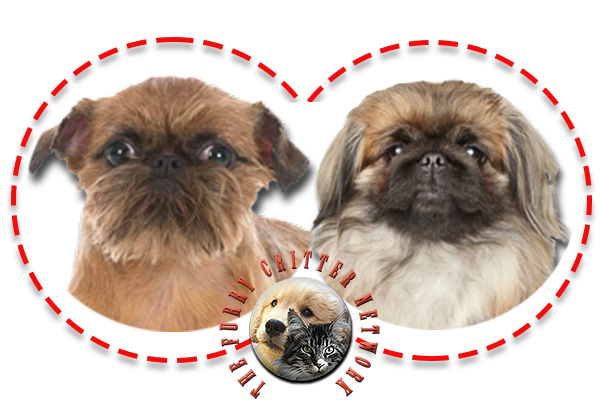
“Griffonese Hybrid Description – FCN” from www.furrycritter.com and used with no modifications.
Brussels Griffon vs. Chihuahua
Chihuahuas and Brussels Griffons are both small breeds with big personalities. Chihuahuas are known for their bold and sometimes feisty nature, while Brussels Griffons are more sociable and affectionate. Chihuahuas are generally more independent and can be wary of strangers, whereas Brussels Griffons tend to be more welcoming and friendly.
Both breeds are low-maintenance in terms of grooming, especially if you choose a smooth-coated Brussels Griffon. However, Chihuahuas are known for their minimal grooming needs, making them a good choice for those seeking a low-maintenance pet. When choosing between these two breeds, consider your preference for temperament and the level of socialization you desire in a pet.
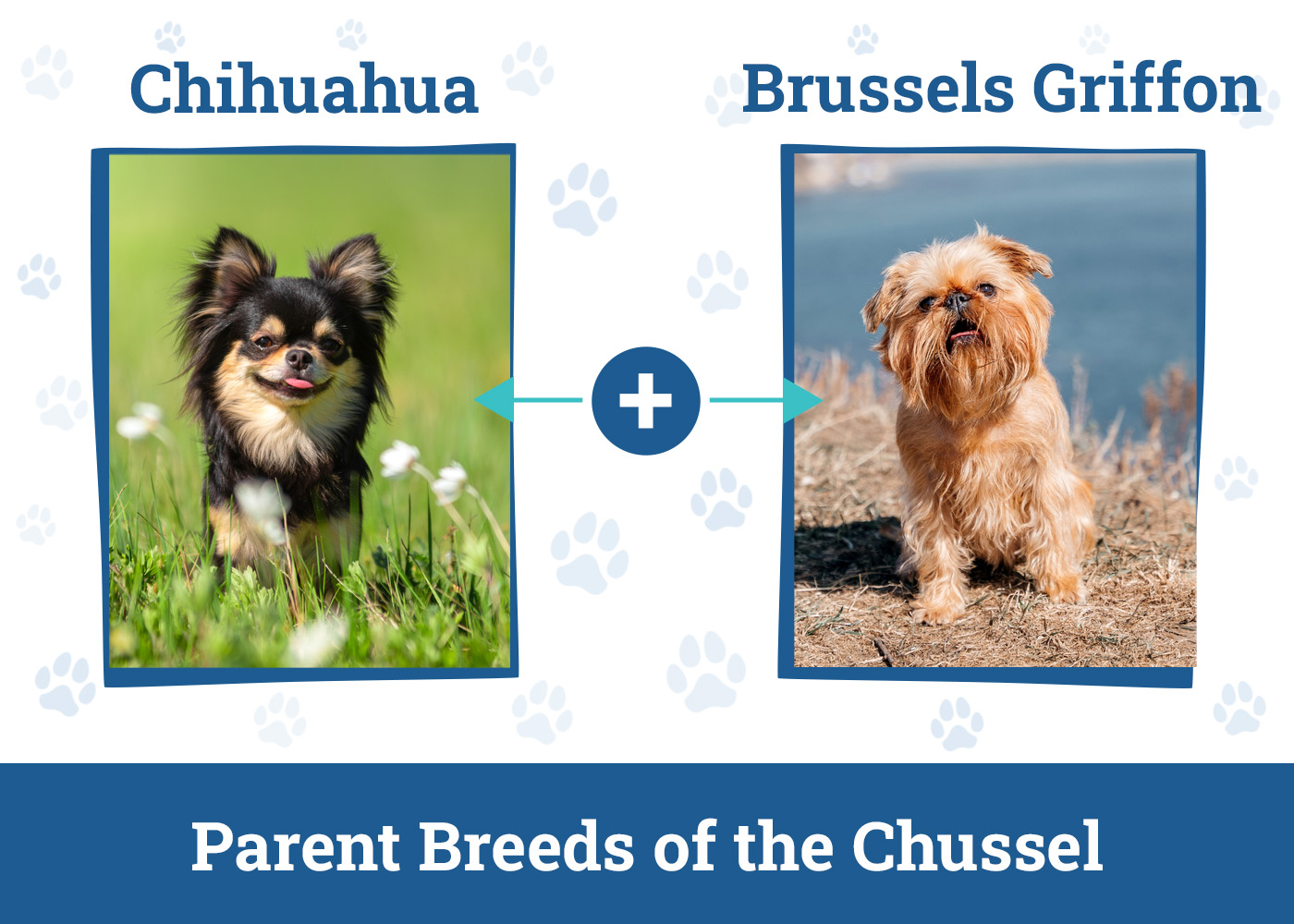
“Chussel (Chihuahua & Brussels Griffon …” from www.dogster.com and used with no modifications.
Final Thoughts on Adopting a Brussels Griffon
Adopting a Brussels Griffon can bring joy and companionship to your life. These dogs are affectionate, loyal, and full of personality. However, it’s important to be prepared for the responsibilities that come with owning this breed, including their grooming needs and potential health issues.
“Brussels Griffons are more than just pets; they become cherished members of the family, offering endless love and companionship.” – A Brussels Griffon Owner
When considering adoption, take the time to research and find a reputable breeder or rescue organization. This ensures that you bring home a healthy and well-adjusted pet. Additionally, be prepared to invest time and effort into their care, providing them with the attention and love they deserve.
:strip_icc()/breed-profile-brussels-griffon-1117946-29061d0f38104fdfa37c543d164f7114.jpg)
“Brussels Griffon (Griff): Dog Breed …” from www.thesprucepets.com and used with no modifications.
Deciding If This Breed Is Right for You
Before deciding to adopt a Brussels Griffon, evaluate your lifestyle and ability to meet their needs. Consider factors such as your living space, schedule, and willingness to invest in grooming and veterinary care. If you are seeking a loyal companion that thrives on human interaction, a Brussels Griffon may be the perfect addition to your family.
It’s important to ensure that you can provide a stable and loving environment for your new pet. If you’re prepared for the commitment, a Brussels Griffon can bring immense joy and companionship to your life.
Resources and Support for New Owners
As a new Brussels Griffon owner, it’s essential to have access to resources and support. Consider joining breed-specific forums or social media groups where you can connect with other owners and share experiences. These communities can offer valuable advice and support as you navigate the joys and challenges of owning a Brussels Griffon.
Additionally, consult with your veterinarian for guidance on health care and nutrition. They can provide personalized recommendations to ensure your pet remains healthy and happy. With the right resources and support, you can enjoy a fulfilling and rewarding relationship with your Brussels Griffon.
Frequently Asked Questions
When considering adopting a Brussels Griffon, you may have several questions about the breed and the adoption process. Here are some common questions and answers to help you make an informed decision.
How much does it cost to adopt a Brussels Griffon?
The cost to adopt a Brussels Griffon typically ranges from $300 to $500. This fee often includes initial veterinary care, such as vaccinations and spaying or neutering. Additional expenses for supplies and ongoing care should also be considered.
Do Brussels Griffons require a lot of grooming?
Grooming needs depend on the coat type. Smooth-coated Brussels Griffons require minimal grooming, while rough-coated ones need regular trimming to maintain their appearance. Regardless of coat type, they are generally low-shedding. For more detailed information, you can read about Brussels Griffon grooming needs.
Regular brushing and occasional baths are recommended to keep their coat healthy and clean. Professional grooming services may be required for rough-coated Griffons, depending on your grooming preferences.
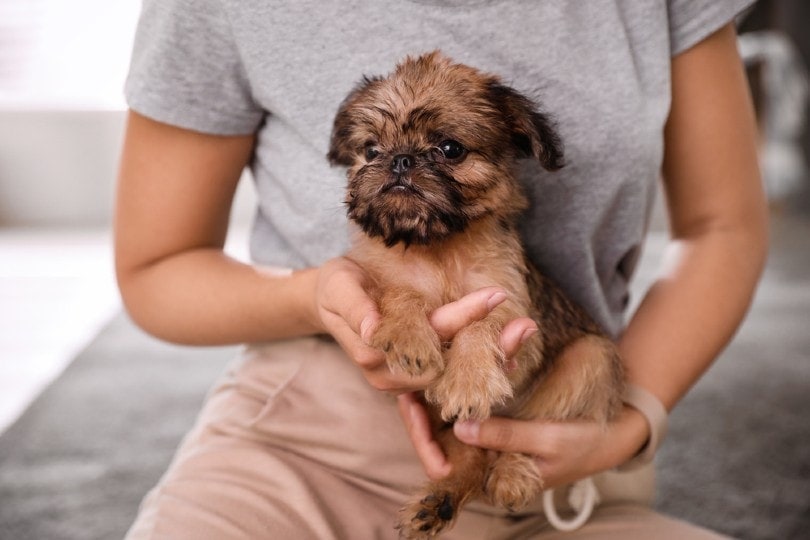
“Brussels Griffon: Dog Breed Info …” from www.dogster.com and used with no modifications.
Are Brussels Griffons good with children?
Brussels Griffons can be good with children, but it’s important to teach kids how to interact with them gently. Their small size makes them more susceptible to injury from rough play, so supervision is recommended during interactions. For more tips on preparing your home for a new pet, check out our rescue pet home preparation guide.
What should I ask a rescue group before adopting?
When adopting from a rescue group, inquire about the dog’s health history, temperament, and any special needs. Ask about their adoption process and any post-adoption support they offer. It’s also important to understand their return policy in case the adoption does not work out.
Gathering this information will help you make an informed decision and ensure that you find a pet that fits well with your family and lifestyle.
How do Brussels Griffons compare to other similar breeds?
Brussels Griffons are often compared to breeds like Pugs, Pekingese, and Chihuahuas. While they share some similarities, such as size and companionship traits, each breed has its unique characteristics and care requirements. If you’re considering adopting a pet, it’s important to understand the pet adoption myths that might affect your decision.
Consider factors such as grooming needs, temperament, and health concerns when comparing these breeds. By understanding the differences, you can choose the breed that best aligns with your lifestyle and preferences.
Brussels Griffons are similar to other toy breeds like the Affenpinscher, sharing many of the same traits and characteristics. These adorable dogs are known for their charming personalities and unique looks, making them a popular choice for those looking for a small, affectionate companion.
